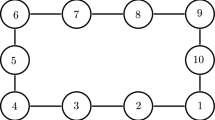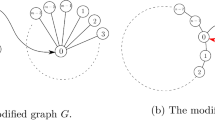Abstract
This paper addresses the bipartite consensus of the nonlinear discrete-time multi-agent systems on network where cooperation and confrontation exist simultaneously. The communication graph has negative weights to represent antagonistic interaction among agents. Two kinds of distributed variable impulsive protocols are designed for case with leader and leaderless. Compared with existing fixed-time impulsive protocols, the action instant of variable impulsive protocol is in a time window and not fixed, which is more suitable for practical application. By employing Lyapunov function approach and comparison system theorem, the results reveal that the bipartite leaderless consensus and bipartite tracking consensus can be achieved. Meanwhile, the rate of bipartite consensus possess the characteristic of exponential, if some conditions are met. Finally, the effectiveness of the consensus analysis is verified by three simulation examples.
Similar content being viewed by others
References
X. Zhan, L. Cheng, J. Wu, Q. Yang, and T. Han, “Optimal modified performance of mimo networked control systems with multi-parameter constraints,” ISA Transactions, vol. 84, pp. 111–117, January 2019.
J. Hu, X. Zhan, J. Wu, and H. Yan, “Optimal tracking performance of ncss with time-delay and encoding-decoding constraints,” International Journal of Control, Automation, and Systems, vol. 18, no. 4, pp. 1012–1022, April 2020.
X. Jiang, M. Chi, X. Chen, T. Huang, H. Yan, and T. Huang “Output tracking control performance of discrete networked systems over erasure channel with model uncertainty,” IEEE Transactions on Cybernetics, pp. 1–9, 2021.
X. Jiang, X. Chen, T. Huang, and H. Yan, “Output tracking control of single-input-multi-output systems over an erasure channel,” IEEE Transactions on Cybernetics, pp. 1–9, 2020.
Y. Li and G. Yang, “Adaptive neural control of pure-feedback nonlinear systems with event-triggered communications,” IEEE Transactions on Neural Network and Learning Systems, vol. 29, no. 12, pp. 6242–6251, December 2018.
Z. Xu, C. Li, and Y. Han, “Leader-following fixed-time quantized consensus of multi-agent systems via impulsive control,” Jounal of the Frankin Institute, vol. 356, no. 1, pp. 441–456, January 2019.
X. Hu, Z. Zhang, C. Li, and L. Li, “Leader-following consensus of multi-agent systems via a hybrid protocol with saturation effects,” International Journal of Control, Automation, and Systems, pp. 124–136, January 2021.
G. Guo, Y. Zhao, and G. Yang, “Cooperation of multiple mobile sensors with minimum energy cost for mobility and communication,” Information Sciences, vol. 254, pp. 69–82, January 2014.
A. Pietrabissa and L. R. Celsi, “Discrete-time selfish routing converging to the wardrop equilibrium,” IEEE Transactions on Automatic Control, vol. 64, no. 3, pp. 1288–1294, March 2019.
P. Ghofrani, W. Tong, and A. Schmeink, “A fast converging channel estimation algorithm for wireless sensor networks,” IEEE Transactions on Signal Processing, vol. 66, no. 12, pp. 3169–3184, June 2018.
Y. Cao, W. Yu, W. Ren, and G. Chen, “An overview of recent progress in the study of distributed multi-agent coordination,” IEEE Transactions on Indurstrial Informatics, vol. 9, no. 1, pp. 427–438, February 2013.
R. Olfati-Saber and R. M. Murray, “Consensus problems in networks of agents with switching topology and time-delays,” IEEE Transactions on Automatic Control, vol. 49, no. 9, pp. 1520–1533, September 2004.
S. Monaco and L. R. Celsi, “On multi-consensus and almost equitable graph partitions,” Automatica, vol. 103, pp. 53–61, May 2019.
W. Yu, W. X. Zheng, G. Chen, W. Ren, and J. Cao, “Second-order consensus in multi-agent dynamical systems with sampled position data,” Automatica, vol. 47, no. 7, pp. 1496–1503, July 2011.
H. Li, G. Chen, X. Liao, and T. Huang, “Leader-following consensus of discrete-time multiagent systems with encoding-decoding,” IEEE Transactions on Circuits and Systems II—Express Briefs, vol. 63, no. 4, pp. 401–405, April 2016.
B. Li, H. Yang, Z. Chen, and Z. Liu, “Containment control of multi-agent systems with time-delays over heterogeneous networks,” International Journal of Control, Automation, and Systems, vol. 17, no. 10, pp. 2521–2530, October 2019.
S. H. Lee, M. J. Park, and O. M. Kwon, “Improved synchronization criteria for chaotic neural networks with sampleddata control subject to actuator saturation,” International Journal of Control, Automation, and Systems, vol. 17, pp. 2430–2440, September 2019.
R. Sakthivel, T. Saravanakumar, Y. Ma, and S. M. Anthoni, “Finite-time resilient reliable sampled-data control for fuzzy systems with randomly occurring uncertainties,” Fuzzy Sets and Systems, vol. 329, pp. 1–18, 2017.
T. Saravanakumar, N. Muoi, and Q. Zhu, “Finite-time sampled-data control of switched stochastic model with non-deterministic actuator faults and saturation nonlinearity,” Jounal of the Frankin Institute, vol. 357, no. 18, pp. 13637–13665, 2020.
T. Saravanakumar, S. M. Anthoni, and Q. Zhu, “Resilient extended dissipative control for markovian jump systems with partially known transition probabilities under actuator saturation,” Jounal of the Frankin Institute, vol. 357, no. 10, pp. 6197–6227, 2020.
Y. Ye and H. Su, “Leader-following consensus of nonlinear fractional-order multi-agent systems over directed networks,” Nonlinear Dynamics, vol. 96, no. 2, pp. 1391–1403, April 2019.
J. Chen, B. Chen, and Z. Zeng, “Synchronization and consensus in networks of linear fractional-order multi-agent systems via sampled-data control,” IEEE Transactions on Neural Network and Learning Systems, vol. 31, no. 8, pp. 2955–2964, August 2020.
P. Selvaraj, R. Sakthivel, S. Marshal Anthoni, M. Rathika, Y.-C. Mo, “Dissipative sampled-data control of uncertain nonlinear systems with time-varying delays,” Complexity, vol, 21, no. 6, pp, 142–154, July, 2016.
J. Liu, Y. Zhang, Y. Yu, and C. Sun, “Fixed-time event-triggered consensus for nonlinear multiagent systems without continuous communications,” IEEE Transactions on Systems Man Cybernetics-Systems, vol. 49, no. 11, pp. 2221–2229, November 2019.
J. Liu, Y. Zhang, Y. Yu, and C. Sun, “Fixed-time leader-follower consensus of networked nonlinear systems via event self-triggered control,” IEEE Transactions on Neural Network and Learning Systems, vol. 31, no. 11, pp. 5029–5037, 2020.
L. Ding, Q. Han, X. Ge, and X. M. Zhang, “An overview of recent advances in event-triggered consensus of multiagent systems,” IEEE Transactions on Cybernetics, vol. 48, no. 4, pp. 1110–1123, April 2018.
C. Altafini, “Consensus problems on networks with antagonistic interactions,” IEEE Transactons on Automatic Control, vol. 58, no. 4, pp. 935–946, April 2013.
G. Wen, H. Wang, X. Yu, and W. Yu, “Bipartite tracking consensus of linear multi-agent systems with a dynamic leader,” IEEE Transactions on Circuits and Systems II—Express Briefs, vol. 65, no. 9, pp. 1204–1208, 2018.
Y. Cai, H. Zhang, J. Duan, and J. Zhang, “Distributed bipartite consensus of linear multiagent systems based on event-triggered output feedback control scheme,” IEEE Transactions on Systems Man Cybernetics-Systems, vol. 51, no. 11, pp. 6743–6756, 2021.
J. Huang, L. Chen, X. Xie, M. Wang, and B. Xu, “Distributed event-triggered consensus control for heterogeneous multi-agent systems under fixed and switching topologies,” International Journal of Control, Automation, and Systems, vol. 17, no. 8, pp. 1945–1956, August 2019.
Z. Xu, C. Li, and Y. Han, “Impulsive consensus of nonlinear multi-agent systems via edge event-triggered control,” IEEE Transactions on Neural Network and Learning Systems, vol. 31, no. 6, pp. 1995–2004, June 2020.
Y. Han, C. Li, Z. Zeng, and H. Li, “Exponential consensus of discrete-time non-linear multi-agent systems via relative state-dependent impulsive protocols,” Neural Networks, vol. 108, pp. 192–201, December 2018.
Y. Han and Z. Zeng, “Asynchronous impulsive protocols with asymmetric feedback saturation on leader-based formation control of multiagent systems,” IEEE Transactions on Cybernetics, pp. 1–12, 2020. DOI: https://doi.org/10.1109/TCYB.2020.3037150.
C. Ke, C. Li, and L. You, “Consensus of nonlinear multiagent systems with grouping via state-constraint impulsive protocols,” IEEE Transactions on Cybernetics, vol. 51, no. 8, pp. 4162–4172, 2021.
Y. Han, C. Li, W. Zhang, and H. G. Ahmad, “Impulsive consensus of multiagent systems with limited bandwidth based on encoding-decoding,” IEEE Transactions on Cybernetics, vol. 50, no. 1, pp. 36–47, January 2020.
J. Tan, C. Li, and T. Huang, “Comparison system method for a class of stochastic systems with variable-time impulses,” International Journal of Control, Automation, and Systems, vol. 16, no. 2, pp. 702–708, April 2018.
X. Hu, Z. Zhang, C. Li, and Q. Zhang, “A hybrid protocol for the average consensus of multi-agent systems with impulse time window,” Jounal of the Frankin Institute, vol. 357, no. 7, pp. 4222–4241, May 2020.
Y. Han, C. Li, and Z. Zeng, “Asynchronous event-based sampling data for impulsive protocol on consensus of nonlinear multi-agent systems,” Neural Networks, vol. 115, pp. 90–99, July 2019.
Funding
This work was supported by the National Natural Science Foundation of China (Grant No: 61873213), Chongqing Graduate Research and Innovation Project in 2020 (Grant No: CYB20172), and the Chongqing Research Program of Basic Research and Frontier Technology (Grant No: cstc2015jcyjBX0052).
Author information
Authors and Affiliations
Corresponding author
Additional information
Ziqiang Xu received his B.S. degree in the College of Mechartronics and Control Engineering from Hubei Normal University, Huangshi, China, in 2016, and an M.S. degree in the College of Electronic and Information Engineering, Southwest University, Chongqing, China, in 2019. He is currently pursuing a Ph.D. degree with the School of Communication and Information Engineering, Chongqing University of Post and Telecommunications, Chongqing, China. His research interests include consensus of multi-agent systems, nonlinear control systems and stability of impulsive control systems, wireless and mobile communication networks.
Chuandong Li received his B.S. degree in applied mathematics from Sichuan University, Chengdu, China in 1992, and an M.S. degree in operational research and control theory and a Ph.D. degree in Computer Software and Theory from Chongqing University, Chongqing, China, in 2001 and in 2005, respectively. He has been a Professor at the College of Electronic and Information Engineering, Southwest University, Chongqing, China, since 2012, and has been an IEEE Senior member since 2010. From November 2006 to November 2008, he served as a research fellow in the Department of Manufacturing Engineering and Engineering Management, City University of Hong Kong, Hong Kong, China. He has published more than 200 journal papers. His current research interest covers computational intelligence, neural networks, memristive systems, chaos control and synchronization, and impulsive dynamical systems.
Yun Li received his Ph.D. degree in communication engineering from the University of Electronic Science and Technology of China, Chengdu, China, in 2004. He is a Professor of Electrical Engineering with the College of Communications, Chongqing University of Posts and Telecommunication, Chongqing, China. He (co-)authored more than 150 journal/conference articles. His research interests include multiagent system, mobile cloud computing, cooperative/relay communications, green wireless communications, wireless ad hoc networks, sensor networks, and virtual wireless networks.
Yiyan Han received his B.S. degree from the College of Optoelectronic Engineering, Chongqing University, Chongqing, China, in 2014, and an M.S. degree from the College of Electronic and Information Engineering, Southwest University, Chongqing, in 2019, respectively. He is currently pursuing a Ph.D. degree with the School of Artificial Intelligence and Automation, Huazhong University of Science and Technology, Wuhan, China. His current research interests include impulsive control and adaptive control on multiagent systems.
Xiang Hu received his B.S. and M.S. degrees from the College of Computer and Information Science, Southwest University, Chongqing, China, in June 2012 and June 2015, respectively. He is currently pursuing a Ph.D. degree with the School of Communication and Information Engineering, Chongqing University of Post and Telecommunications, Chongqing, China. His current research interests include stability of dynamical systems, wireless and mobile communication networks, and multiagent systems.
Publisher’s Note
Springer Nature remains neutral with regard to jurisdictional claims in published maps and institutional affiliations.
Rights and permissions
About this article
Cite this article
Xu, Z., Li, C., Li, Y. et al. Bipartite Consensus of Nonlinear Discrete-time Multi-agent Systems via Variable Impulsive Control. Int. J. Control Autom. Syst. 20, 461–471 (2022). https://doi.org/10.1007/s12555-020-0792-z
Received:
Revised:
Accepted:
Published:
Issue Date:
DOI: https://doi.org/10.1007/s12555-020-0792-z




